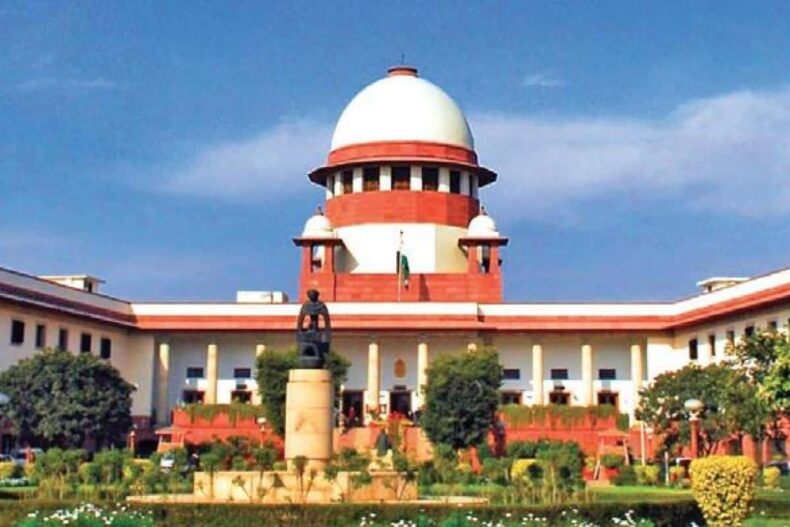The 103rd Constitutional Amendment Act, which establishes a 10% EWS quota for the economically disadvantaged (EWS) from forward castes, has been maintained by the Supreme Court. Also, it ruled that it poses no harm to the basic structure of the constitution.

The SC verdict granted 10% reservation in government jobs and educational institutions to the “economically weaker sections of the society,” and upheld the landmark judgement on Monday by a 3:2 majority of the Constitution Bench. The “poorest of the poor” in the Scheduled Castes (SC), Scheduled Tribes (ST), Socially and Educationally Backward Classes (SEBC), and Other Backward Classes(OBC), however, are exempted from its application.
The Chief Justice of India U U Lalit and Justice S Ravindra Bhat opposed, while Justices Dinesh Maheshwari, Bela M Trivedi, and J B Pardiwala concurred. Even so, they all agreed that the modification does not violate the Constitution’s fundamental principles.
In his ruling, Justice Maheshwari stated that reservations are a tool of affirmative action by the government to enable an inclusive march toward the objective of an egalitarian system while combating disparities. It exists for the aid of not just the socially and educationally weaker sections but also to any other section so disadvantaged so as to be deemed a weaker section. In light of the above, he claimed that making reservations based solely on the economic background does not infringe upon any fundamental provisions of the Constitution and does not harm its fundamental design.
The legislature “acknowledges and realises the demands of the people,” Justice Trivedi said. The three judges who constituted the majority ruled that the Basic Structure of the Constitution was not violated by reservations based solely on economic criteria.
Questions put forth by the Constitution Bench
- Whether the 103rd Constitutional Amendment breaches the fundamental principles of the basic structure by only offering reservations based on economic grounds.
- Whether the amendment infringes the basic structure of the constitution by removing the poor from the SC/ST/OBC categories’ EWS Quota.
- Whether the amendment violates the fundamental framework by going over the 50% upper limit.

The Verdict regarding the EWS quota
All five judges on the bench agreed that economic criteria could be a sound legal basis for affirmative action by the State.
The majority’s position on the exclusion of Scheduled Castes (SC), Scheduled Tribes (ST), and Socially and Educationally Backward Classes (SEBC) from the benefits of the EWS quota rule was not shared by the Chief Justice of India U U Lalit and Justice Bhat.
Stating the minority judgement, Justice Bhat said, “this exclusion breaches the equality code’s non-discrimination and non-exclusionary aspect, which in turn violates structure. Although the amendment expands chances for the EWS quota sections, it violates constitutional prohibitions against discrimination by excluding the impoverished among the SCs, STs, and SEBCs from its scope.”
The petitioners had stated that only the “middle class” of the advanced castes who earned less than 8 lakh as a household annually were left to benefit from the EWS quota due to the exclusion of SC/ST/SEBC/OBC.
Justice Trivedi in her judgement said, “Just as equals cannot be treated unequally, neither can unequals be treated equally. Treating unequals equally violates harmony under the Constitution. The impugned amendment has to be regarded as an affirmative step towards a just society by the Parliament. It cannot be classified as unreasonable. Classifying EWS as a separate class would be a reasonable categorisation.”
Additionally, Justice Maheshwari stated that the additional quota for EWS above the cap of 50% does not threaten the fundamental design, arguing that the ceiling is not sacrosanct on its own and only extends to the quota intended by Articles 15(4), 15(5), and 16(4) of the Constitution.
Justice Bhat, on the other hand, disapproved of the exclusion of underprivileged groups, labelling it an effort to “heap fresh injustice based on prior incapacity.”
The exclusionary language that excludes backward classes, SC/STs, and people with economic reservations “strikes a start of the end to the equality and unity principle which penetrates the equality code and non-discrimination principle,” according to Justice Bhat.
Read More: https://tdznkwjt9mxt6p1p8657.cleaver.live/special-nia-court-jihadi-not-a-crime/













